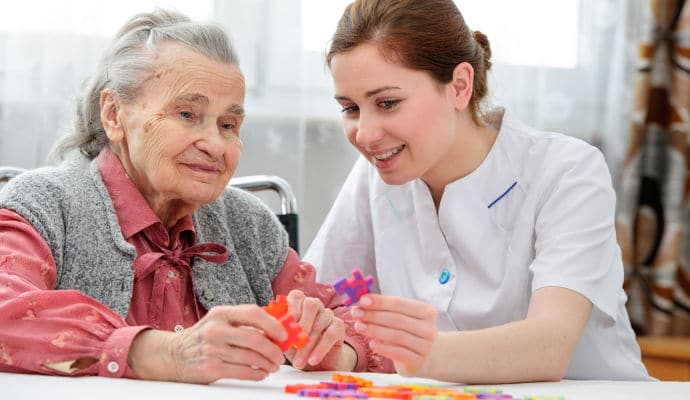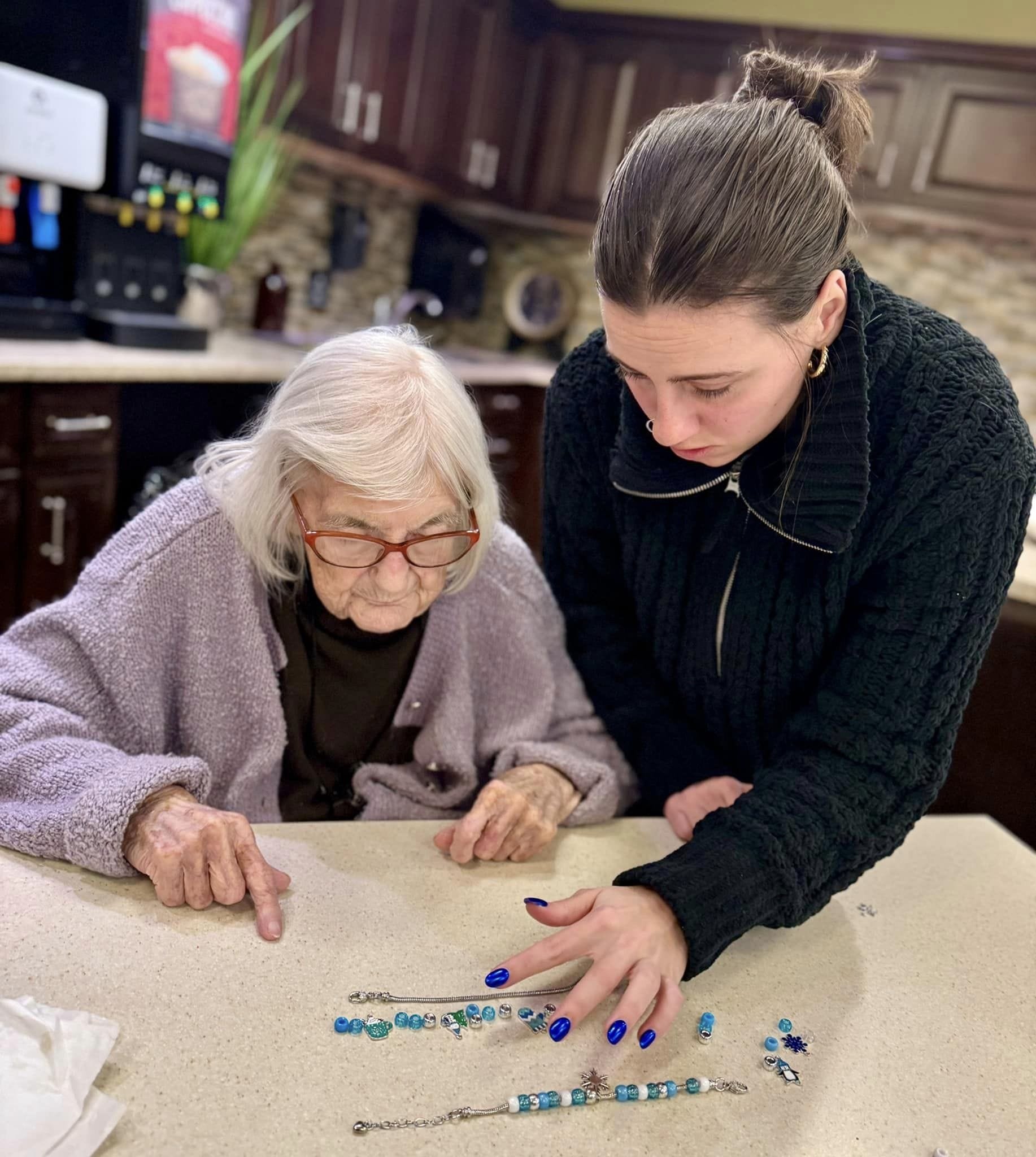Producing Safe and Comfortable Rooms with Alzheimers Care Charlotte Programs
Producing Safe and Comfortable Rooms with Alzheimers Care Charlotte Programs
Blog Article
Creating a Safe and Helpful Environment for Alzheimer's Treatment
The creation of a supportive and secure setting for individuals with Alzheimer's is extremely important in improving their quality of life. This entails not just physical adjustments within the home, such as minimizing threats and integrating acquainted elements, but additionally the application of organized routines and purposeful activities that cater to their cognitive demands. Recognizing the emotional and emotional dimensions of care can significantly affect their feeling of security and connection. Checking out these diverse strategies can reveal crucial insights into reliable caregiving methods that may transform the daily experiences of both caregivers and patients.
Understanding Alzheimer's Needs
Regularly, individuals with Alzheimer's illness show a series of needs that need customized techniques to care. As the condition advances, cognitive decline materializes in numerous means, affecting memory, reasoning, and even the ability to perform everyday activities. Caregivers have to identify these advancing requirements to supply ideal assistance and guarantee a better of life for those influenced.
One essential facet of recognizing Alzheimer's requirements is recognizing the importance of regular and familiarity. People frequently discover convenience in established patterns, which can minimize anxiousness and confusion. Caregivers need to aim to create organized everyday schedules that include significant activities lined up with the person's interests and capacities.
Furthermore, effective interaction is critical. People with Alzheimer's may have a hard time to reveal themselves or comprehend complex language. Caretakers ought to use basic, clear language, use non-verbal signs, and practice energetic listening to promote understanding and connection.
Caregivers ought to motivate engagement in community activities or household celebrations, advertising a sense of belonging and function. Recognizing these varied demands is important for producing a supportive care environment.
Designing a Safe Home
Producing a risk-free home for people with Alzheimer's disease is necessary to reducing dangers and promoting independence. The design of the home should prioritize security while enabling personal convenience. Remove potential hazards such as loose rugs, sharp things, and mess, which can lead to drops or accidents. Make sure that pathways are clear and well-lit, as correct lighting minimizes disorientation and enhances flexibility.
Integrating adaptive functions is also important. Install grab bars in washrooms and near stairs, and take into consideration utilizing non-slip floor coverings in wet areas. In addition, utilizing different shades for floors and wall surfaces can aid in differentiating spaces, assisting to minimize confusion.
Familiarity is essential for individuals with Alzheimer's. Customizing the setting with familiar items and photographs can strengthen a feeling of belonging and safety - Alzheimers Care Charlotte. It is additionally advantageous to have actually a marked location for day-to-day tasks, such as reading or crafting, which can offer framework to their day
Finally, applying a protected outside room permits safe exploration while linking with nature. By attentively designing the home setting, caregivers can dramatically improve the quality of life for individuals dealing with Alzheimer's condition.
Enhancing Communication Abilities

Non-verbal communication, consisting of faces, gestures, and touch, plays i was reading this a crucial duty in sharing empathy and understanding. Maintaining eye get in touch with and a calm temperament can improve the comfort degree of the person, promoting a sense of safety and security.
In addition, it is crucial to practice energetic listening. This involves being completely present, showing patience, and permitting the person to reveal themselves without disturbance. Rep may be necessary; caretakers ought to be prepared to take another look at topics or questions, as people with Alzheimer's may fight with memory recall.
Additionally, making use of visual help or signs, such as photographs or acquainted objects, can facilitate acknowledgment and interaction. Inevitably, enhancing interaction skills is about developing trust and developing an environment where individuals really feel heard, valued, and understood, consequently enhancing their lifestyle.
Motivating Social Communication
Fostering significant social interactions can substantially boost the health of individuals with Alzheimer's illness. Engaging with others not just assists fight sensations of seclusion but likewise boosts cognitive function and emotional health and wellness. Structured social next activities, such as team games, arts and crafts, or music treatment, create possibilities for residents to link with peers and caretakers, which can bring about boosted mood and reduced anxiety.
Producing a welcoming setting that urges socializing is crucial. This can be achieved by setting up common areas that promote communication, such as comfy seating areas or activity spaces. Furthermore, integrating familiar and culturally appropriate tasks can urge and trigger memories engagement, permitting people with Alzheimer's to really feel even more linked to their previous experiences.
Moreover, caregivers should be educated to identify and promote social interaction among citizens. By prioritizing social communication, we can dramatically enhance the lives of those living with Alzheimer's, fostering a feeling of neighborhood and belonging.
Supporting Caregiver Well-being

To sustain caregivers, organizations must supply regular training and educational resources to enhance their understanding of Alzheimer's condition and caregiving techniques. Supplying accessibility to reprieve treatment services permits caregivers to take necessary breaks, minimizing stress and anxiety and fatigue - Alzheimers Care Charlotte. In addition, fostering a neighborhood via support system can help with emotional sharing and the exchange of sensible guidance among caregivers, producing a network of shared support
Mental health and wellness sources, such as therapy solutions, can additionally be vital in addressing the emotional toll caregiving can take. By prioritizing caretaker health, we develop an even more sustainable caregiving atmosphere that not only benefits the caregivers themselves yet also boosts the total top quality of treatment gotten by individuals with Alzheimer's. Eventually, supporting caregivers is a vital element in fostering a efficient and thoughtful click this link care setup.
Verdict
To conclude, the production of a encouraging and secure atmosphere for individuals with Alzheimer's is essential to boosting their top quality of life. By prioritizing safety via thoughtful layout, promoting emotional well-being with acquainted components, and promoting engagement via structured routines, caretakers can dramatically affect the overall experience of those influenced by this condition. Moreover, sustaining caregiver well-being is crucial, as it inevitably adds to an extra efficient and compassionate treatment atmosphere.
Rep may be essential; caregivers must be prepared to revisit subjects or questions, as people with Alzheimer's may have a hard time with memory recall.

Report this page